
VOIVOD – Warchaic
Anthony Morgan
January 2013
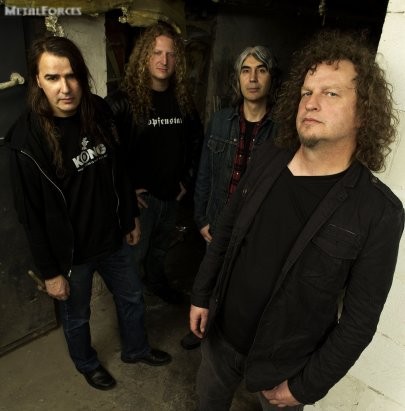
|
Late guitarist Denis ‘Piggy’ D’Amour – an original member of Jonquière, Québec, Canada-based heavy metal outfit Voivod from 1982 until his death from colon cancer in August 2005 at the age of 45 – was inducted into the Québec Metal Hall Of Fame on September 1st, 2007. The ceremony took place at Club Soda in Montreal, Québec. Former bassist Jean-Yves ‘Blacky’ Theriault and Martyr guitarist Daniel Mongrain (later nicknamed ‘Chewy’) arranged and performed a medley which consisted of excerpts from Voivod’s first five full-lengths, namely War And Pain (August 1984), Rrröööaaarrr (March 1986), Killing Technology (April 1987), Dimension Hatröss (June 1988), and Nothingface (October 1989).
Voivod vocalist Denis ‘Snake’ Bélanger and drummer Michel ‘Away’ Langevin were in attendance, culminating in Blacky’s return to Voivod as well as the inclusion of Chewy. A June 22nd, 2008 performance at the Heavy MTL festival in Montreal marked the group’s first live outing since the passing of Piggy, and their first overall in almost five years. “Blacky was living in Vancouver for quite awhile,” Snake recalls. “At Piggy’s funeral he let us know that if he could help in any way, he would be there. Time went by, but we kept in our minds that he wanted to do something for Piggy. The tribute show to Piggy with Chewy and some other guys in Montreal went really well, and that’s when we saw Chewy playing Voivod. When we saw Chewy playing these songs, we were like ‘Oh my God. Does he fucking nail it or what?’ After that, Blacky came to us and said ‘If you want to do something together with me and Chewy, it’s possible.’ In the meantime, we had an offer to play the Heavy MTL Festival. We wanted to turn a page, so me and Michel sat and talked about it. ‘What do you think? Wouldn’t it be cool to get Blacky back in the picture, and Chewy?’
“We were kind of scared of the reaction though. Some of the fans said that nobody could replace Piggy, and that it would be impossible to do it. We weren’t sure about the reaction, but then we finally went for it and played that festival. The show was amazing, and the response was so great. That’s when we realised that Chewy could do the job. Blacky was back and was playing bass like the old days, and the vibe was so cool. The reaction of the crowd was crazy, and the next day the phone started to ring from everywhere in the world. We had offers to play at festivals in Europe and so on, and so from that point we didn’t stop (laughs). That was in 2008. That’s how it happened, like that (laughs).”
Blacky’s return brought an official closure to the tenure of erstwhile Metallica bassist Jason Newsted, who had been a member of Voivod since 2002. Jason performed on three Voivod records, specifically Voivod (March 2003) Katorz (July 2006) and Infini (June 2009). “I think after Piggy’s death, it became complicated to continue,” the vocalist reflects. “I think he wanted to do just studio stuff with us. He didn’t really want to get out touring, but he did really cool bass lines on Infini and Katorz as well. Now he has a new project. Back then it was like ‘Okay, we have something to finish,’ but we didn’t want to get this work left on the shelf collecting dust. We wanted to finish that, so we did. It’s great, but as for getting the band out there he didn’t see it that way. In the meantime, Blacky came back and Chewy came into the picture. It came naturally, because we live quite far apart (laughs). He lives in California and we live in Québec, Canada, and so the switch kind of went naturally. Back in the day, he was doing many studio projects and he was into painting. He was into a lot of different stuff, but he really contributed a lot to the two albums Infini and Katorz.”
Blacky had originally exited Voivod prior to the issue of November 1991’s Angel Rat, the album nonetheless featuring his services. “You should ask him why he left,” Snake chuckles. “Back in the day, we had a bit of a conflict with him and he had a bit of a conflict with us. That’s over now though. It’s pretty hard to keep a band for a long term, and make everybody happy all of the time. It’s really complex, and sometimes people get sick of it. Me, when I left, I had my problems – I had my stuff. I was kind of bummed out about certain things, and then I left as well. I think he had his own reasons for leaving, and I respect that. We’ve grown up since then (laughs). We’ve kept on doing it now after 30 years, and put some stuff aside. We say ‘Okay, let’s do it like we’re adults. We’re doing it for fun, so let’s do it positively. Let’s do it without any regrets, and let’s have fun together.’ That’s how it’s been since 2008 when he came back, and we’re having fun together now. Back in the day he had his own problems and his own thing, but that’s how it goes in a band (laughs).”
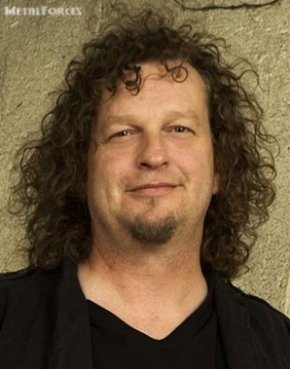
|
The frontman’s Voivod exile lasted from 1994 until 2002. That specific departure was a conflict of personalities perhaps, the band spending too much time together. “It had something to do with that,” he admits. “Being in a band, you travel together, you eat together, you go to the shower together (laughs). Back then, we were young. It’s different when you’re young, and when you’re older. When you’re a bit older, you can put things into perspective. You’re more able to work together than when you had stupid attitudes (laughs). Now I think it’s perfect. Chewy has done a lot of team-work. He’s a real team player; when something doesn’t go well or someone needs to talk, Chewy is always there and is really open for any discussions. It’s all about communication, but you don’t have communication when you’re younger. You just say what you have to say, but when you get older I think you’re more able handle things even if they’re good or bad.”
A lack of communication can cause a departure from the ranks of a musical ensemble, but Snake feels that this wasn’t the case. “It was more a bit of disappointment on my part, and back in the day there was a huge grunge explosion,” he notes. “Metal was so out (laughs). It became really tough. That thing was a fashion thing almost, the big grunge wave and stuff. Metal bands were cutting their hair off (laughs). That was kind of a strange period, but I had my own personal problems as well. I was kind of sick and tired of everything. I don’t know. It’s hard to explain, but that’s how it happened. I think I just wanted to take a break, but you can’t ask other musicians to take a break for you for awhile (laughs). They’re gonna say ‘Well… We’ve gotta keep going dude.’ I didn’t want to keep on doing it, and not have fun.”
At the age of 11, Chewy saw the music video for Voivod composition ‘Ravenous Medicine’ (from Killing Technology) on the television channel MusiquePlus. “He bought a guitar, and started to learn how to play Piggy’s parts,” the singer recounts. “Voivod was his favourite band, and that’s how he’s so good at it. Because he’s younger, we were his main influence. When Piggy died and he did a tribute show, I think he saw it coming, that he could do it. He did it just for a show in the beginning, but he was so good at it. We had goosebumps. When he was playing Piggy’s stuff, we were like ‘Oh my god.’ If you closed your eyes, Piggy was in the room. We were so amazed. Piggy was such a unique player with a unique technique and a unique sound, and it’s pretty hard to reproduce. He’s feeling great about doing it. He honours Piggy every time he plays the guitar; I think he respects Piggy a lot. I think he was the best candidate to fill those big shoes.”
Snake once owned a cat named Chewy, perhaps the origins of the guitarist’s moniker. “Maybe that’s how it happened,” Snake muses. “We were looking for a name for him. One day somehow I shouted ‘Chewy,’ and everybody started laughing. Back then he was a bit bigger (laughs). Now he’s lost a lot of weight (laughs). I don’t know if we can call him Chewy still. Chewy’s such a nice person too – he’s so sweet. When I said that, everybody started laughing and said ‘Let’s call him Chewy.’”
Each of Voivod’s members sport a nickname. “Our French names didn’t sound cool for a metal band (laughs), and a lot of musicians have nicknames too,” the co-founder observes. “Piggy might’ve been called Piggy because he was a little piggy (laughs). I don’t know. Back in the day, we called Away Away because he always seems like he isn’t here (laughs). I think Blacky was nicknamed Blacky because his dog was named Blacky. I was doing improvisation and theatre, and Michel was in the crowd. I did something like an impression of a worm, and he saw that. He said ‘Let’s call him Snake.’ Everybody agreed, I guess. That’s how it went (laughs).”
Writing sessions for January 2013’s Target Earth – Voivod’s 16th studio outing – were “a long process. We toured a lot with the new line-up including Chewy and Blacky, since 2008. We didn’t know whether we wanted to do another album, but slowly and naturally we put riffs together and just really did a lot of work. The big task was creating Voivod without Piggy. I was worried at first, because I thought we would never be able to get even close to what Piggy was able to do. Chewy did a great, great job. He let himself go as a fan, because firstly he was a fan and created the Voivod album that fans would like to hear. I think he really succeeded in that.
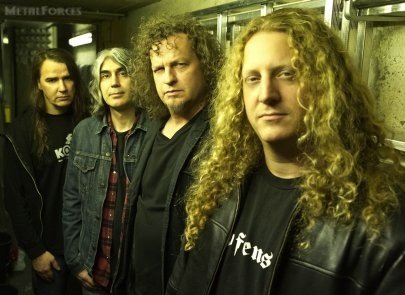
|
“It’s all there; it’s really Voivod’ish. The core is there, and he adds his own special spice too. It seemed natural. We didn’t really force it. On a daily basis we were adding stuff here and there, and then we had a couple of songs. We did pre-production at Blacky’s house. We really, really put things together there before going into the real studio, and so when we went into the real studio we were really ready to lay down tracks and finalise the process. I think after being together for quite a bit, the need to create was there and we had to do it. That’s basically how it went.”
A 16th studio album was always firmly on the cards. “Infini was Piggy’s stuff, and so we wanted to turn a page and get stuff together for a new album,” Snake explains. “I think it was so obvious that we couldn’t just tour with a bunch of old songs, and not do anything new. For us it was just a natural process, I guess.”
A fresh slate denotes Target Earth, pre-existing guitar parts cut by Piggy absent. “It was great, actually,” the vocalist confesses. “Like I said, the need to create was there. We’re all into the task, and we’re all excited about doing these new songs. Each time Blacky was coming in with something new for example, we were like ‘Oh yeah… That sounds good.’ The vibe was pretty positive. When you have such a positive feeling about something, you put in a lot of effort. The whole thing gets easier when it’s all new, because it sounds fresh and new. It sounds like it has the Voivod style in it; it really sounds like Voivod, but it’s the new Voivod. It was quite exciting to create these new songs, because when we were dealing with Infini and touring wasn’t depressive, but just knowing that Piggy wasn’t there was just like a postmortem thing and it puts you in a weird feeling. This time it was all new though, all fresh, and all positive. Plus, creating with Blacky was like creating back in the day. It was really fun.”
Chewy performs with an array of artists, Target Earth being his inaugural Voivod outing of course. “He’s doing great shows in Québec with different artists,” Snake compliments. “He’s pretty versatile. His day job is being a music teacher, and he’s always involved in different projects and different shows. Sometimes it’s doing something with a bunch of people, a bunch of artists. They put together a show each year to collect funds for the poor, and stuff like that. He directs a big orchestra as well (laughs). He’s really versatile in music, and that’s how he understands what Piggy was all about. On Target Earth though let’s say, he put the key styles where they were needed like in the riffs.
“In the solo you can tell that he keeps the solo for himself though, and then you can really feel his personality. That’s the biggest task he had to do with this record, which was not to be a copycat of Piggy. He kept the elements of what Voivod is all about, like the little effects here and there, Piggy’s core in the main riffs and stuff like that, but he did his own thing. It really sounds like it’s Piggy’s playing, but I don’t think he’s a copy of Piggy though. I think he integrates his own style into Voivod’s music He’s a really, really talented guy, there’s no doubt about it.”
Chewy authored a wealth of riffs for inclusion. “He came up with a lot of riffs, but putting together the songs was a process that we all contributed towards together,” the frontman discerns. “Sometimes it was Blacky who came up with a bass riff, and Chewy would lay down guitar tracks on it. Sometimes it was the opposite. Me and Michel watched these two guys and tried to put our own stuff into it, but most of the writing comes from him and Blacky.”
Target Earth is arguably resemblant of 80s Voivod. “I think that it really sounds a bit like Dimension Hatröss, Killing Technology, and Nothingface era, but like I said earlier, it’s fresh,” Snake stresses. “It isn’t like we’re doing the same stuff over and over. It sounds fresh, but it’s in the same vein of those albums that the fans wanted us to come back to. We realised when we were touring that most of the kids there were hooked on Killing Technology and Dimension Hatröss, so we wanted to go back to those kinds of songs. I think we achieved that, but it’s more like 2013 Voivod with all of the elements that Voivod are known for. I would say some of it is taken from those albums, just in the way that the construction is done.
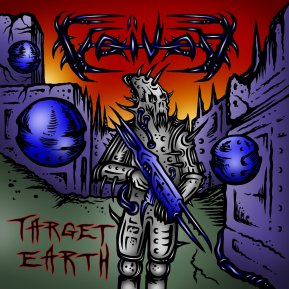
|
“The musical construction is more complex, has different tempo shifts, and has the same approach that we had during the Killing Technology, Dimension Hatröss, and Nothingface period. During that period of time, we were really focused on and crazier about using more complex stuff. It’s really hard to explain (laughs). The new one is fresh though, so I don’t think it’s the same as it was back in the day. It’s the same kind of complex structures though, and the same weird way of putting stuff together. I think Chewy really understood what a Voivod album should be for a fan. His favourite album was Dimension Hatröss and stuff like that, so I think that’s why it sounds a little like those albums. It’s the new Voivod as well though.
“It’s pretty hard to explain, but maybe it’s because it’s all new for us in a sense. Having Chewy as a composer who’s different than Piggy, maybe that’s why, and maybe also because Chewy got involved in little details. Even when I was doing my vocals he was really finetuning the vocals a bit, like ‘Ah, you should sing this part a bit higher,’ or ‘… lower’ or ‘You’re not doing the pitch right here.’ He was giving me these cues here and there. Piggy wasn’t doing that back in the day. Piggy was letting me lay down my vocals as I wanted to, but Chewy really finetunes every little detail about everything. It really helps in a sense, because as a musician and as a music teacher he can bring stuff that me and other people couldn’t think about. That really helped the process, and that’s how it’s a bit different than what we did earlier.”
The similarities between Target Earth and Voivod’s 80s material can be partially attributed to the return of Blacky. “That is also a part of it,” the singer recognises. “I think the Blower Bass is back, and the way Blacky riffs is really aggressive sometimes. You can feel that, and that I think is something the fans will appreciate – Blacky’s return. That was a big element during those albums like Dimension Hatröss. Blacky being back and Chewy being in the band is the right combination, the real Voivod (laughs).”
Snake pursued different approaches in recording his vocals. “Each song is different,” he reckons. “I think each song has its own thing, so sometimes you try different things on a song and then other things on other songs. It has to go well, and it has to repeat itself from one song to another. My trademark is to double my vocals usually, which I did this time but on every song. I tried different things with harmonies. Chewy was helping me a lot with, like I said, for instance finetuning stuff. Voivod’s core has a lot of notes in them, and sometimes it’s choosing which notes you have to repeat to sound okay. Like I said, Chewy was helping me in different parts, trying new things here and there that I never really experienced. You have to be creative on every song, even if it’s just more of an effect or something. Every aspect of a song can be done in different ways, and sometimes the idea could be from another person. The process of working together creates great stuff.”
The familiar mixture of science fiction as well as social issues characterise Target Earth’s lyrical content. “We had this new vibe, a new cycle after 2012 which was supposedly to be the end of the world,” the co-founder laughs. “I think it’s in fact a new cycle, and ‘Target Earth’ has a double meaning. It could be a threat from outer space, but it could be that we should be more aware of our home planet. It could be that we should be conscious about what we do to this planet, and try to make it better. It has an environmental side to it mixed with fiction, mixed with different stories. The songs talk a lot about war. ‘Empathy For The Enemy’ is more about the aftermath of war, when you go to war and come back – how fucked up your head is. ‘Warchaic’ is about the nonsense of war. ‘Kaleidos’ is more of a spy fiction kind of thing (laughs).
“Each song has a different story, and a different meaning. From one song to another, I want to wake people up in a sense. When I create, I try to have different ideas for people to think about – important issues, a lot of social issues. The song ‘Resistance’ for instance was more based on stuff that happened here in Montreal in the spring of 2012 when there were student riots every night. We threw our government out, but it was a really riotous period. It’s all inspired by different stuff. It’s not a concept album like Dimension Hatröss, but it has a lot of social issues mixed with science fiction, wars and conflict, mixed with craziness (laughs).”
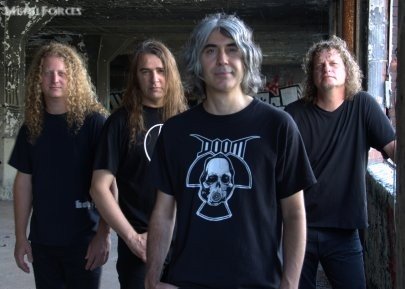
|
The full-length’s deluxe edition version includes a live rendition of ‘Man In The Trees’, recorded on April 15th, 2011 at the Roadburn festival in Tilburg, The Netherlands. Voivod’s studio version featured on June 2005 album Lean Into It, a tribute to Milwaukee, Wisconsin hardcore assemblage Die Kreuzen. Die Kreuzen’s original recording surfaced on 1986’s October File. “We wanted to play it live for the first time, having the singer and me singing together,” Snake informs. “It came out good, and we wanted to share that with people (laughs). The Roadburn show was in Holland, and that was recorded there. The singer Dan Kubinski came onstage, and we sang the song together. It was real fun.”
Title cut ‘Target Earth’ was also performed at the 2011 Roadburn festival. “I think people there were really focused on it, and were all excited about hearing a new song,” the vocalist remembers. “I think they appreciated hearing a new song. It’s always thrilling to play new songs, especially when they’re good and people love them (laughs). It’s always cool. I hope this new record will make people happy, the real Voivod fans. We’ll see (laughs).”
As is the case with all Voivod platters, Target Earth’s cover artwork was designed by Away. “We all share and put ideas together, but we let him create,” Snake shares. “We’re not always around him saying ‘You should draw this’ and ‘You should draw that.’ We all share ideas together. I would see this and that. He came up with a nice logo, and he came up with the skull which is on the back of the cover. We let him do what he has to do. It came out good; each time he surprises me with different things. It’s pretty Voivod’ish, and that’s why it’s so colourful. We wanted to do a mixture of the colours of War And Pain and Dimension Hatröss – a kind of red – mixed with the purple we had on Angel Rat and Nothingface. He mixed the purple and the red together for this album, and it was good. It was great, but I can’t tell what his inspiration was. That’s his own thing (laughs).”
A music video is in the pipeline. “I’m working on it right now,” the frontman divulges. “We’re trying to get some financial grant. I keep on doing it every day bit by bit. I don’t know if we’re gonna have one by this month or next month, but I hope it’s gonna work because I’ve put a lot of effort into it (laughs). Hopefully it’ll happen.”
Voivod passed the 30th anniversary mark in 2012. “It’s a great feeling,” Snake enthuses. “30 years of Voivod… When we started the band, nobody knew that we would last that long (laughs). Nobody even thought that, but we keep going. We’ve gone through so many good things, and bad things. When I look back after 30 years, it’s quite amazing what we’ve achieved for a little band from northern Québec. We were born in a small town in northern Québec, which isn’t like being a band from LA or New York. It was a long trail for us. We never had it easy, but sometimes that made us stronger in a sense and more focused on what we were doing. When I look back though… Especially when I think about Piggy, he’s not here to celebrate that. He’s in our memory, and we’ll keep on doing it and keep on thinking about him. It’s a great feeling. We have the feeling that we’ve accomplished something, and who knows? Maybe we’re gonna go for another ten years.”
A Voivod documentary has been in the works for quite some time, to be helmed by fellow countryman Sam Dunn. Sam’s credits include the documentaries Metal: A Headbanger’s Journey (2005) and Iron Maiden: Flight 666 (2009), not to mention a number of other heavy metal related works. “He’s still working on it,” the singer discloses. “He has a lot of projects, but hopefully it’s gonna be this year. There’s a few more recordings that he wants and needs to do, but he already has a lot of stuff that he did a couple of years ago and so he wants to finish that. I don’t know his plans though, or when he wants to do it. Hopefully, it’s gonna be this year.”
Target Earth was released in Germany, Austria, and Switzerland on January 18th, 2013, in North America, Spain, and Italy on the 22nd, in Sweden and Hungary on the 23rd, in Australia, New Zealand, and Finland on the 25th, and in the rest of Europe on the 21st, all via Voivod’s own company Iron Gang Factory and Century Media Records.
Interview published in January 2013. All promotional photographs by Axel Jusseit, except where noted.





